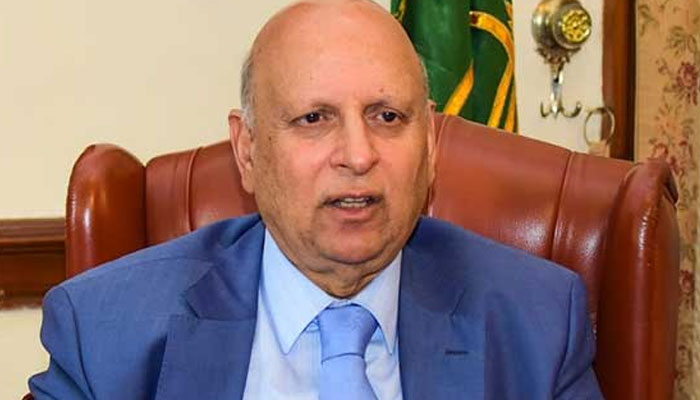Punjab governor denies hand in case against Nawaz Sharif
LAHORE: Punjab Governor Chaudhry Sarwar has said that the mutiny case against PML-N leaders has nothing to do with the PTI government, including himself.
The governor stated this while talking to media after addressing two different events on Tuesday in which he also clarified his position over the allegations of links with Badr Rashid, the person behind the registration of the case against former Prime Minister Nawaz Sharif.
This is noteworthy that pictures of Badr Rashid, the complainant of the case against Nawaz Sharif, came to surface on Tuesday in which he was seen with PTI leadership, including the Punjab governor. Ch Sarwar while commenting on the issue that it was necessary to investigate why and who registered the case. “I think this case should not have been registered. Prime Minister Imran Khan has also expressed his displeasure over this case” said Sarwar. There are pictures of Badr Rashid with the PML-N and other people because he keeps on changing parties.
Talking to the media, the governor said it was unfortunate that he was alleged to have involved in a mutiny case against PML-N leaders. Political members and other people come to meet him in the Governor's House.
“If a person files a lawsuit against someone, it does not mean that I am behind it”, he added. Replying to a question, the governor said, "I have never called anyone a traitor in my life and I do not believe in filing cases against political opponents. I want to make it clear that we have nothing to do with this case. I challenge the accusers to prove that the case was filed by the PTI government. The fact is that the PTI government has nothing to do with the case against the PML-N leaders.
Addressing the event, Ch Sarwar said that extremism and sectarianism had created an environment due to which mutual tolerance was declining. It is a challenge for our universities that we do not have tolerance for differences of opinion.
He said that neither new avenues of research could emerge in the universities nor the solution could be found to the challenges without inculcating tolerance among the students. He said that the parliamentarians had a key role to play in achieving success in this regard.
-
 Bridgerton’s Michelle Mao On Facing Backlash As Season Four Antagonist
Bridgerton’s Michelle Mao On Facing Backlash As Season Four Antagonist -
 King Charles Gets New ‘secret Weapon’ After Andrew Messes Up
King Charles Gets New ‘secret Weapon’ After Andrew Messes Up -
 Shia LaBeouf Makes Bold Claim About Homosexuals In First Interview After Mardi Gras Arrest
Shia LaBeouf Makes Bold Claim About Homosexuals In First Interview After Mardi Gras Arrest -
 Princess Beatrice, Eugenie ‘strained’ As They Are ‘not Turning Back’ On Andrew
Princess Beatrice, Eugenie ‘strained’ As They Are ‘not Turning Back’ On Andrew -
 Benny Blanco Addresses ‘dirty Feet’ Backlash After Podcast Moment Sparks Online Frenzy
Benny Blanco Addresses ‘dirty Feet’ Backlash After Podcast Moment Sparks Online Frenzy -
 Sarah Ferguson Unusual Trait That Confused Royal Expert
Sarah Ferguson Unusual Trait That Confused Royal Expert -
 Prince William, Kate Middleton Left Sarah Ferguson Feeling 'worthless'
Prince William, Kate Middleton Left Sarah Ferguson Feeling 'worthless' -
 Ben Affleck Focused On 'real Prize,' Stability After Jennifer Garner Speaks About Co Parenting Mechanics
Ben Affleck Focused On 'real Prize,' Stability After Jennifer Garner Speaks About Co Parenting Mechanics -
 Luke Grimes Reveals Hilarious Reason His Baby Can't Stop Laughing At Him
Luke Grimes Reveals Hilarious Reason His Baby Can't Stop Laughing At Him -
 Why Kate Middleton, Prince William Opt For ‘show Stopping Style’
Why Kate Middleton, Prince William Opt For ‘show Stopping Style’ -
 Here's Why Leonardo DiCaprio Will Not Attend This Year's 'Actors Award' Despite Major Nomination
Here's Why Leonardo DiCaprio Will Not Attend This Year's 'Actors Award' Despite Major Nomination -
 Ethan Hawke Reflects On Hollywood Success As Fifth Oscar Nomination Arrives
Ethan Hawke Reflects On Hollywood Success As Fifth Oscar Nomination Arrives -
 Tom Cruise Feeling Down In The Dumps Post A Series Of Failed Romances: Report
Tom Cruise Feeling Down In The Dumps Post A Series Of Failed Romances: Report -
 'The Pitt' Producer Reveals Why He Was Nervous For The New Ep Of Season Two
'The Pitt' Producer Reveals Why He Was Nervous For The New Ep Of Season Two -
 Maggie Gyllenhaal Gets Honest About Being Jealous Of Jake Gyllenhaal
Maggie Gyllenhaal Gets Honest About Being Jealous Of Jake Gyllenhaal -
 'Bridgerton' Star Luke Thompson Gets Honest About Season Five
'Bridgerton' Star Luke Thompson Gets Honest About Season Five




